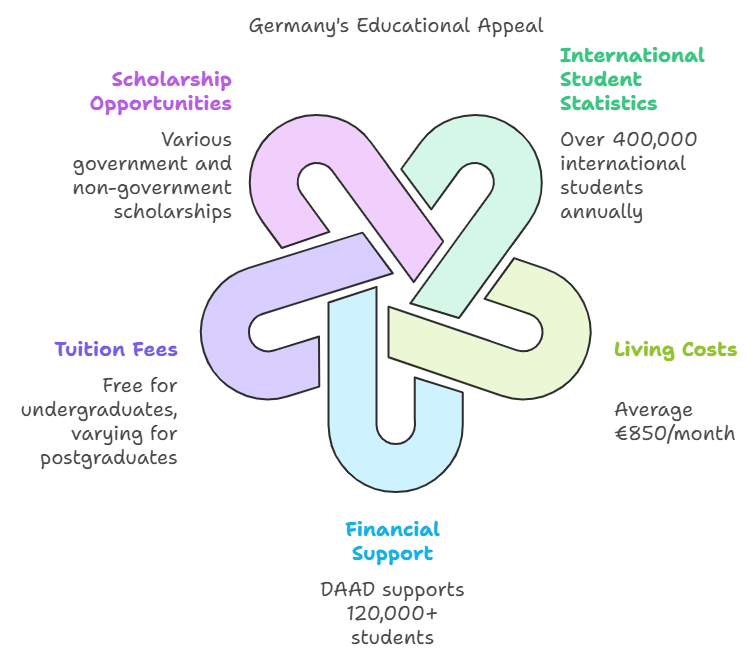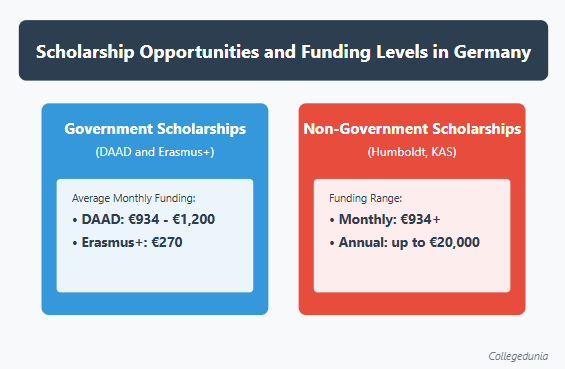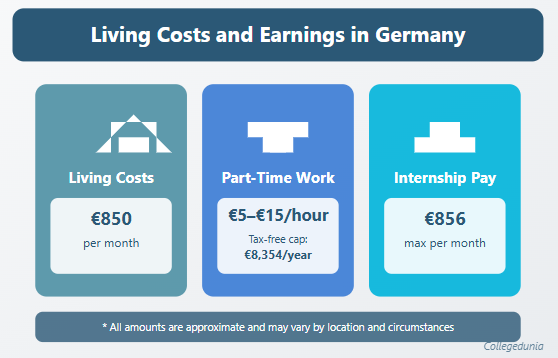.png?h=35&w=35&mode=stretch)
Yatin Kumar Study Abroad Content Specialist
Study Abroad Content Specialist
Germany is a global leader in higher education, offering exceptional scholarship opportunities to international students. With its unique blend of world-class universities, practical learning approaches, and extensive financial support programs, Germany attracts over 400,000 international students annually. Its tuition-free undergraduate education, coupled with low living costs in Germany and a wide range of scholarships, makes it an affordable and accessible destination for those pursuing academic excellence. From government-funded programs like DAAD to private scholarships, Germany ensures that students from all backgrounds can access high-quality education while gaining valuable hands-on experience in their chosen fields.
| Key Highlights | Details |
|---|---|
| Living Expenses | €850 or 75.6K INR per month |
| DAAD Scholarship Recipients | 120,000+ students and researchers |
| Tuition Fees | Free for undergraduates Master's/Ph.D. fees vary by program and institution |
Also Read: List of Popular Scholarships in Germany
- Government Scholarships in Germany for International Students
- Non-Government Scholarships in Germany for International Students
- Top Grants and Scholarships in Germany
- Application Requirements for Scholarships in Germany
- Germany Scholarship Application Process
- Work While You Study Programs in Germany
- Internships in Germany
- FAQs
Government Scholarships in Germany for International Students
Germany offers a wide range of merit-based scholarships and need-based grants, primarily funded by the government and private organizations. These scholarships aim to ease the financial burden on international students while ensuring access to quality education.

| Scholarships are often determined based on the student's financial situation and academic performance, typically ranging from €150 to €934 per month (2024). |
DAAD Scholarships:
The German Academic Exchange Service (DAAD) provides an extensive range of scholarships for foreign students across various degree levels.
- Postgraduate Students: €934/month.
- Doctoral Students: €1,200/month.
- Additional Benefits: Health insurance, travel allowance, and research grants.
Read More: DAAD Scholarships
Erasmus+:
Administered by the European Commission, Erasmus+ is one of the largest providers of scholarships in Europe.
- Funding: €270/month (average for Germany).
- Eligibility: Open to students enrolled in European partner institutions.
Non-Government Scholarships in Germany for International Students
Germany offers a variety of non-governmental scholarships to support international students across different fields and academic levels. These scholarships are provided by foundations, research institutions, and private organizations, aiming to foster global academic collaboration and excellence.
| Scholarship | Details | Amount Granted (€) | Application Deadline |
|---|---|---|---|
| Einstein International Postdoctoral Fellowship | Supports postdoctoral research at institutions in Berlin. | 20,000 per year | May 29, 2025 |
| Humboldt Research Fellowships for Postdoctoral Researchers | Open to researchers of all nationalities and disciplines. | 2,670 per month | December 31, 2024 |
| Konrad-Adenauer-Stiftung (KAS) Scholarships | Available for international master's and Ph.D. candidates under 30. | Master's: 934/month; Ph.D.: 1,400/month | July 15, 2025 |
| Kurt Hansen Science Scholarships | Funded by the Bayer Foundation for science education students. | 10,000 per year | April 15, 2025 |
| Marie Skłodowska-Curie Actions (MSCA) Fellowships | Supports postdoctoral research in EU countries, including Germany. | Varies; competitive salary and allowances | September 13, 2025 |
| Mawista Scholarship | For students studying abroad while caring for a child. | 3,000 one-time payment | January 15, 2025 |
Note: Application deadlines are subject to change; always verify with the official scholarship websites.
These scholarships provide substantial financial support, covering tuition fees, living expenses, and sometimes additional costs such as health insurance and travel allowances. Prospective applicants should review the specific eligibility criteria and application procedures for each scholarship to ensure they meet all requirements.

Also Read: How to Study in Germany for Free
Top Grants and Scholarships in Germany
Germany provides numerous scholarship opportunities for international students, supporting academic excellence and reducing financial barriers. Below are some of the most prominent grants and scholarships available.
Deutschlandstipendium National Scholarship Programme (Germany Scholarship Program)
The Deutschlandstipendium National Scholarship Programme offers financial aid to academically talented and committed students from all nationalities. It is one of the most inclusive programs, not dependent on personal or parental income.
- Key Highlights:
- Supports over 22,500 students annually.
- Granted for a minimum of two semesters and extendable to cover the standard study period.
- Open to students at all participating universities in Germany.
- Value: Approximately €300 per month.
| Details | Value/Eligibility |
|---|---|
| Scholarship Value | €300 per month |
| Application Deadline | March 31, 2025 |
DAAD Scholarship Programs
The German Academic Exchange Service (DAAD) provides more than 215 scholarships for international students to study at various degree levels. These programs cater to students and researchers seeking financial assistance for studies, research, or teaching assignments.
DAAD Development-Related Postgraduate Courses (EPOS):
- Eligibility: Graduates with at least two years of professional experience and strong academic achievements.
- Value: €934/month (graduates); €1,200/month (doctoral candidates).
- Application Deadline: Varies; generally between October-December 2024.
DAAD RISE Germany:
- Eligibility: Undergraduate science and engineering students who’ve completed at least two years of study.
- Value: €934/month.
- Application Deadline: Early December 2024.
Graduate School Scholarship Programme (GSSP):
- Eligibility: Recent graduates aiming to pursue a Ph.D. in structured graduate schools in Germany.
- Value: €1,200/month.
- Application Deadline: October 2024.
Helmut-Schmidt-Programme:
- Eligibility: Supports future leaders from developing countries in fields like public policy and governance.
- Value: €934/month.
- Application Deadline: July 31, 2025.
| Scholarship | Eligibility | Monthly Stipend (€) | Application Deadline |
|---|---|---|---|
| Development-Related Postgraduate Courses (EPOS) | Graduates with 2+ years of work experience. | 934 (graduates); 1,200 (doctoral) | October-December 2024 |
| RISE Germany | Undergraduate students in science and engineering. | 934 | Early December 2024 |
| Graduate School Scholarship Programme (GSSP) | Recent graduates pursuing Ph.D. in structured programs. | 1,200 | October 2024 |
| Helmut-Schmidt-Programme | Future leaders from developing countries. | 934 | July 31, 2025 |
Research Scholarships in Germany
Several political and religious foundations in Germany offer scholarships to international students pursuing postgraduate studies or research. These programs aim to support candidates from diverse backgrounds and fields.
Heinrich Böll Foundation Scholarships:
- Eligibility: International students pursuing a Master’s or Ph.D. degree in Germany.
- Value: €1,200/month.
- Application Deadline: September 1, 2025.
Konrad-Adenauer-Stiftung Scholarships (KAS):
- Eligibility: International doctoral candidates pursuing postgraduate programs in Germany.
- Value: €1,200/month.
- Application Deadline: July 15, 2025.
KAAD Scholarships:
- Eligibility: Postgraduate students and researchers from developing countries.
- Value: Not specified.
- Application Deadline: June 30, 2025.
| Scholarship | Eligibility | Monthly Stipend (€) | Application Deadline |
|---|---|---|---|
| Heinrich Böll Foundation Scholarships | Master’s or Ph.D. students from international backgrounds. | 1,200 | September 1, 2025 |
| Konrad-Adenauer-Stiftung Scholarships | Doctoral candidates pursuing postgraduate programs. | 1,200 | July 15, 2025 |
| KAAD Scholarships | Postgraduate students and researchers from developing countries. | Not specified | June 30, 2025 |
Also Check: Exams for Studying in Germany
Application Requirements for Scholarships in Germany
Germany has straightforward yet rigorous requirements for scholarship applications. These requirements ensure that students with the right aptitude and eligibility can benefit from financial support.
| Key Requirements | Details |
|---|---|
| Age Limit | No fixed limit. |
| Degree Completion | Can apply during the final year of study. |
| Foreign Citizenship Consideration | Eligible in some cases for scholarships meant for Germans. |
| Language Proficiency | Requires German or English certificates for application. |
| Document Translation | Non-English/German documents must be translated into these languages. |
Germany Scholarship Application Process
Starting early and organizing your application is essential for scholarship success. Follow these steps for a smooth application process:
- Start Early: Begin at least one year before your intended intake.
- Choose the Right Scholarship: Research government-funded scholarships on the DAAD website, the Deutschlandstipendium at deutschlandstipendium.de, or foundation-based scholarships at kaad.de and kas.de.
- Prepare Documents:
- Letter of motivation.
- Recommendation letter from a university teacher.
- Required academic and language certifications.
- Submit in Appropriate Language: Applications must be submitted in German or English. Ensure non-English/German documents are translated.

Work While You Study Programs in Germany
Germany allows students to work part-time to supplement their living expenses. These opportunities are flexible and can be combined with your academic commitments.
- Work Regulations:
- International students can work 120 full days or 240 half days annually.
- Students earn between €5 to €15/hour, averaging about €450/month.
- Annual tax-free earnings capped at €8,354/year.
- Benefits:
- Tax-free income within the cap.
- No social security payments for certain student earnings.
Also Read: Jobs in Germany
Internships in Germany
Internships are an integral part of student life in Germany, often paid and highly regarded. They provide valuable professional experience while easing financial pressure.
Types of Internships:
- Paid Internships: Regarded as regular employment; earnings can go up to €856/month.
- Curriculum Internships: Mandatory internships exempt from additional permissions.
- Voluntary Internships: Require permission if exceeding 90 working days.
Also Check: Best Cities in Germany for International Students
Internship Rules:
- If you’ve already worked 90 days in a year, seek approval from the Federal Employment Agency for further internships.
- No restrictions for internships integrated into your curriculum.
| Internship Opportunities | Details |
|---|---|
| Compulsory Internships | Integrated into the curriculum; no permissions required. |
| Voluntary Internships | Requires permission after 90 days of work. |
| Earnings | Up to €856 per month. |
| Major Organizations | AIESEC, ELSA, IAESTE. |
|
Finding Internships:
|
Germany combines world-class education with affordable living and ample work opportunities, making it an ideal destination for international students. Scholarships, part-time jobs in Germany, and internships collectively ease the financial burden and enhance academic experiences.
Next Steps:
- Research scholarships suitable for your field and eligibility.
- Start your application early and gather all required documents.
- Explore internship and part-time work opportunities to gain professional experience and financial support.
FAQs
Ques. What are the visa requirements for Indian students to study in Germany?
Ans. Indian students must apply for a student visa (Category D) at the German Embassy or Consulate. Documents required include admission confirmation, financial proof (blocked account or sponsorship), and health insurance.
Ques. Are scholarships in Germany fully funded, and do they cover all expenses?
Ans. Most scholarships partially fund tuition, living costs, or research expenses. Fully funded scholarships, like DAAD, often cover living expenses, travel, and health insurance, but additional personal expenses may need self-funding.
Ques. How do I prove language proficiency for scholarships and admission?
Ans. Students may need German (TestDaF or DSH) or English (IELTS/TOEFL) certifications, depending on the program. Some scholarships specify language requirements in their criteria.
Ques. What are the best fields of study for Indian students in Germany
Ans. Popular fields include Engineering, Computer Science, Business, Life Sciences, and Humanities. Germany is especially renowned for Mechanical and Automobile Engineering programs.
Ques. Is it mandatory to open a blocked account to study in Germany?
Ans. Yes, most Indian students need to open a blocked account to prove financial means (approx. €11,208/year or ₹10 lakh). Alternative options include a sponsorship letter from a resident of Germany.
Ques. Can Indian students work full-time after completing their degree in Germany?
Ans. Yes, Indian students can apply for an 18-month post-study work visa to find employment. After securing a job, they can transition to a work visa or permanent residence.





1720688571.png?tr=w-305,h-145,c-force?h=40&w=40&mode=stretch)










Comments